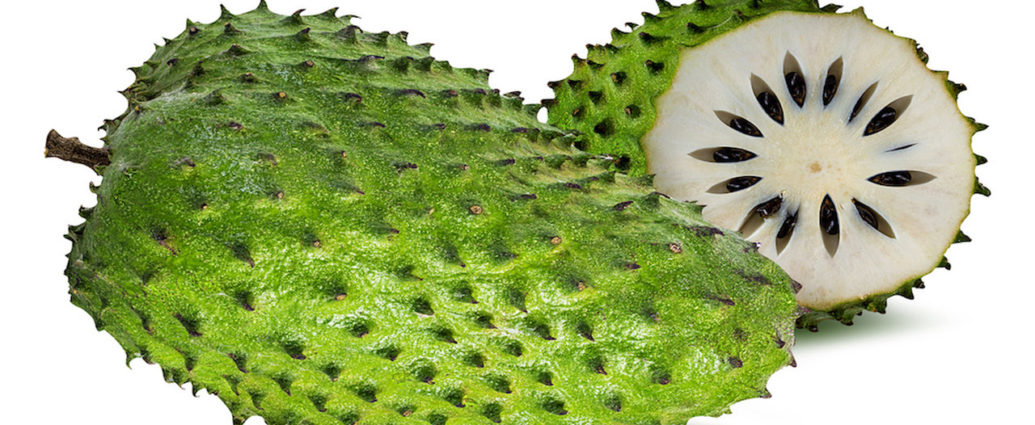HEALTH & WELL BEING
HEALTH BENEFITS OF SASALAPA aka SOURSOP or GRAVIOLA
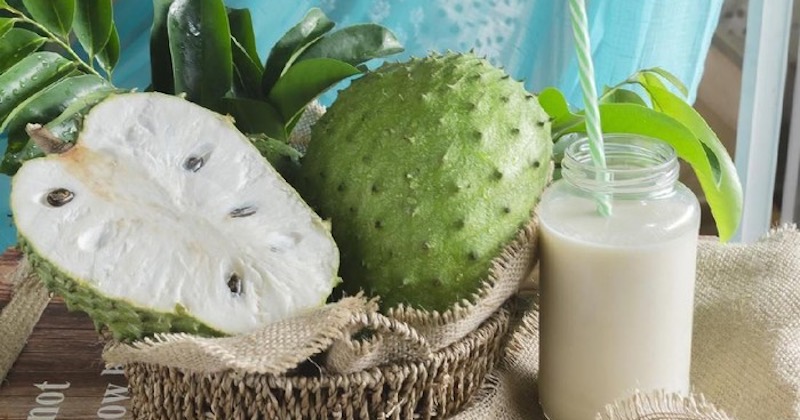
Sasalapa or Soursop is a tropical fruit that you can find in Samoa and other Pacific Islands, parts of South America and even in Florida.
The taste of soursop fruit is a delicious combo of strawberry and pineapple and is most commonly eaten by cutting the fruit in half and scooping out the flesh. The soft pulp and flesh of the fruit can be used in drinks, desserts, smoothies and even candy.
Actually the entire tree including the leaves, the bark and even the root has been used to cure a number of ailments.
Along with the yummy flavour making this a popular fruit, the rich vitamin and nutrient content of the fruit makes it really beneficial to your health. Check out the health benefits below –
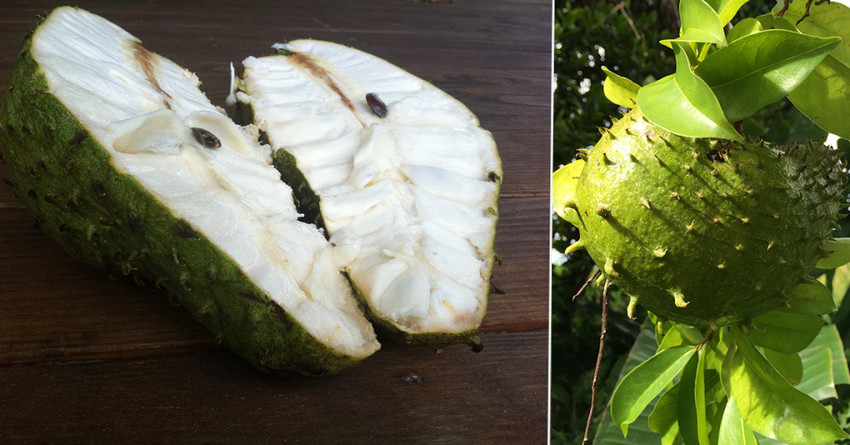
ANTIOXIDANTS
Antioxidants are compounds that help neutralize harmful compounds called free radicals, which can cause damage to cells. Studies show that soursop is high in antioxidants, which may help prevent cell damage and could lower the risk of chronic disease.
HELPS KILL CANCER CELLS
Extensive research has been done on the unique organic compounds of soursop and it has been widely studied as an alternative way of reducing the risk of cancer. It has been found to stop the growth and formation of cancer cells when a study looked at the effects of soursop extract on leukemia cells. In breast cancer cells it was able to reduce tumour size, kill off cancer cells and enhance the activity of the immune system.
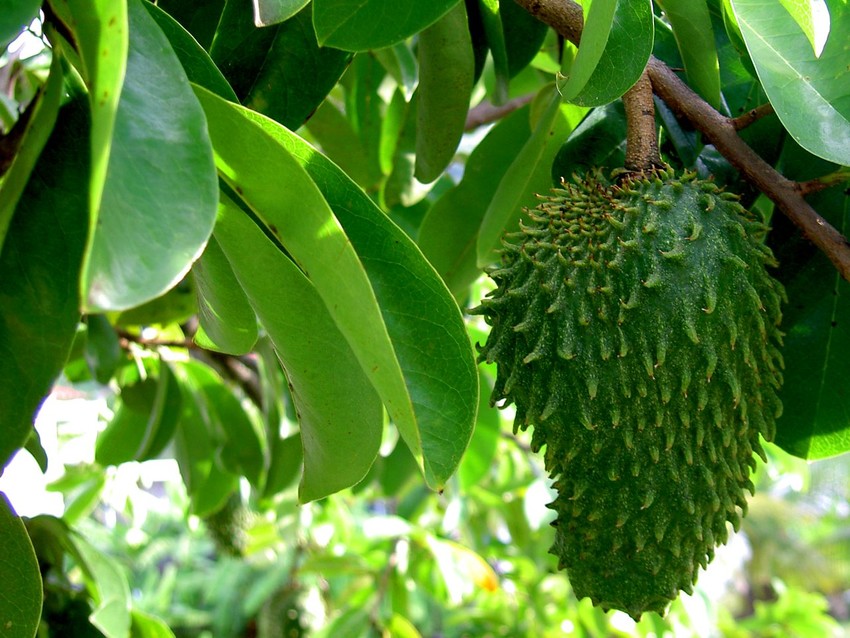
HELPS FIGHT BACTERIA
Soursop is able to effectively kill off multiple types of bacteria, including strains that cause gingivitis, tooth decay and yeast infections.
BOOSTS IMMUNITY
Protecting the immune system is one of the most important components of a healthy diet and fitness regime. Adding a bit of soursop fruit to your diet, either through refreshing beverages or desserts, can positively impact your overall health. It’s rich in Vitamin C which stimulates the production of white blood cells.

IMPROVES GASTROINTESTINAL HEALTH
The juice of the soursop fruit can be a very effective diuretic as it can cleanse the gastrointestinal tract and remove excess toxins and salts from the body. It’s anti-inflammatory components can reduce parasites in the gut and alleviate and pain or irritation in the stomach and colon.
MAY HELP STABILIZE BLOOD SUGAR LEVELS
Although more research on humans is needed, findings suggest that soursop can be more beneficial for those with diabetes when paired with a healthy diet and active lifestyle.

ANAGLESIC PROPERTIES
In terms of pain relief, soursop has been topically applied to wouds and injuries for generations but also works internally to relieve pain and speed healing. The sedative and anti-inflammatory aspects of this impressive tropical fruit makes it an ideal solution for all types of body pain both inside and out.
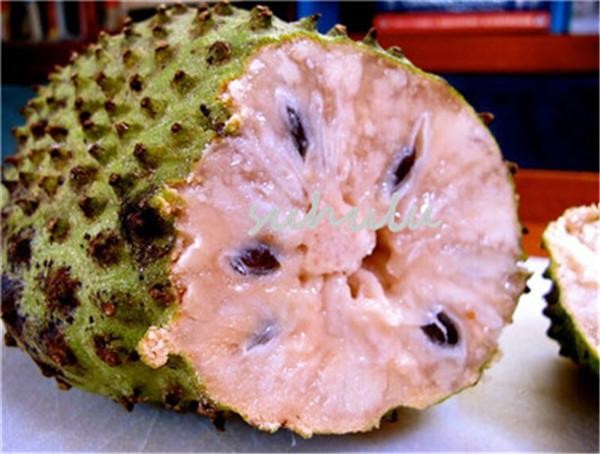
SOURSOP LEAVES –
Treats gout, soothes back pain, relieves stress, treats insomnia, deals with depression and more …
Check out the recipes & instructions for using the leaves to treat the above in this video here:
Soursop Nutrition Facts
The following nutrition information is provided by the USDA for 1 cup (225g) of soursop pulp.1
- Calories: 148
- Fat: 0.7g
- Sodium: 31.5mg
- Carbohydrates: 37.9g
- Fiber: 7.4g
- Sugars: 30.5g
- Protein: 2.3g
- Vitamin C: 46.4mg
- Potassium: 626mg
Carbs
Soursop contains almost 38 grams of carbohydrates per cup. The carbs in soursop come from naturally-occurring sugars, and it contains more than 7 grams of fiber per serving (also about a quarter of your recommended daily intake). The glycemic index of soursop is low.2
Fats
This fruit is very low in fat, providing less than one gram per serving.
Protein
Soursop, like most fruits, is not a good source of protein. A single serving contains only 2.3 grams of protein. So you’ll need to incorporate other protein sources, such as salmon, lean meats, and legumes, into your diet to meet your daily needs.
Vitamins and Minerals
Soursop comes packed with micronutrients. One cup provides 46.4 mg of vitamin C. The USDA recommends an intake of 90 mg per day to support your immune system. Soursop also provides 626 mg of potassium for blood pressure regulation and rapid workout recovery.
Health Benefits
Soursop, also known as graviola or guanabana, may also provide a range of other health benefits. For example, graviola tea—made from the leaves (not the fruit) of the soursop plant—is often used to treat infections (both bacterial and viral) that cause cold-like symptoms. In addition, some people use it to treat sexually transmitted diseases like herpes.
Potential for Cancer Prevention
A 2018 study reported that extracts from soursop fruit, as well as the tree’s bark, roots, and leaves, had the therapeutic potential to combat cancer and other non-malignant diseases.4
However, not enough human data support this claim. Experts from Cancer Treatment Centers of America warn against using soursop as a cancer fighter, and they note that soursop is associated with numerous unsubstantiated claims. Drugs developed from compounds in the soursop plant are more likely to be effective than simply consuming the fruit or tea made from its leaves.5
Promotes Digestive Health
Due to its high fiber content, soursop may aid with proper digestion. The fruit’s juice can also act as a diuretic and cleanse the gastrointestinal tract by removing excess sodium from the body. An extract of soursop has been shown to help heal gastric ulcers in lab animals.6
Fights Inflammation
Like most fruits and vegetables, soursop is a good source of antioxidants, which might help the body repair cell damage and combat inflammation.7
Allergies
There have been no cases of soursop allergy reported in the medical literature. But any food that contains protein can theoretically be allergenic.
Adverse Effects
You should avoid consuming soursop or drinking the fruit in a tea if any of the following apply to you:
- You have diabetes, as graviola has blood sugar-lowering effect in laboratory animals.
- You are taking drugs to reduce hypertension, as graviola is shown to have additive effects when taken with drugs for this health issue.8
- You have liver disease.
- You have kidney disease.9
Studies in laboratory animals have shown that compounds in graviola cause movement disorders and myeloneuropathy, a disease with symptoms similar to Parkinson’s Disease.8
Varieties
In some regions, both “sweet” (less acidic) and “sour” soursop are cultivated. The sweet version is more likely to be eaten raw.
Soursop tea is brewed from the leaves of the soursop tree. It has traditionally been used to relax the body and decrease stress.
When It’s Best
This tropical fruit is mostly available in Central and South America. However, some grocery stores carry frozen soursop.
You can substitute soursop with cherimoya, a popular alternative that is available online and in some groceries. Cherimoya tastes similar to soursop, as it also comes from the custard apple family and offers comparable nutritional value. However, cherimoya does not have the cancer-fighting potential of soursop or the same anti-inflammatory properties.
If you cannot find cherimoya, you can create soursop’s flavor profile by blending together equal parts strawberries, pineapple, and bananas.
Storage and Food Safety
You can store unripe, whole soursop fruits at room temperature. Ripened fruits will keep for a couple of days in the refrigerator.
How to Prepare
Because the fruit is local to the tropics, you will not find soursop in abundance in North America. If you do get your hands on the fruit, you can eat it on its own, as you would any raw fruit. You can also incorporate soursop into syrups, smoothies, and other desserts such as ice creams, candies, and sweet beverages.

